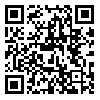Volume 10, Issue 1 (1-2020)
IJOCE 2020, 10(1): 71-90 |
Back to browse issues page
Download citation:
BibTeX | RIS | EndNote | Medlars | ProCite | Reference Manager | RefWorks
Send citation to:



BibTeX | RIS | EndNote | Medlars | ProCite | Reference Manager | RefWorks
Send citation to:
Hosseini S M, Ghodrati Amiri G, Mohamadi Dehcheshmeh M. EFFICIENCY EVALUATION OF PROPOSED OBJECTIVE FUNCTIONS IN STRUCTURAL DAMAGE DETECTION BASED ON MODAL STRAIN ENERGY AND FLEXIBILITY APPROACHES. IJOCE 2020; 10 (1) :71-90
URL: http://ijoce.iust.ac.ir/article-1-421-en.html
URL: http://ijoce.iust.ac.ir/article-1-421-en.html
Abstract: (18004 Views)
Civil infrastructures such as bridges and buildings are prone to damage as a result of natural disasters. To understand damages induced by these events, the structure needs to be monitored. The field of engineering focusing on the process of evaluating the location and the intensity of the damage to the structure is called Structural Health Monitoring (SHM). Early damage prognosis in structures is the fundamental part of SHM. In fact, the main purpose of SHM is obtaining information about the existence, location, and the extent of damage in the structure. Since numerous structural damage detection problems can be solved as an inverse problem based on the proposed objective functions by using optimization algorithm, in this paper, related studies are investigated which discussing objective functions based on Modal Strain Energy (MSE) and flexibility methods including Modal Flexibility (MF), and Generalized Flexibility Matrix (GFM). To illustrate the extent of effectiveness of these objective functions based on the above-mentioned modal parameters, an efficiency index called Impact Factor (IF) is defined. Finally, the best objective function is introduced for each numerical case study based on IF by means of evaluating the obtained result.
Keywords: structural health monitoring (SHM), objective function, modal strain energy (MSE), modal flexibility (MF), generalized flexibility matrix (GFM), impact factor (IF).
Type of Study: Research |
Subject:
Optimal analysis
Received: 2019/12/3 | Accepted: 2019/12/3 | Published: 2019/12/3
Received: 2019/12/3 | Accepted: 2019/12/3 | Published: 2019/12/3
| Rights and permissions | |
 | This work is licensed under a Creative Commons Attribution-NonCommercial 4.0 International License. |





